新概念英语第二册 Lesson1 A private conversation课件(共78张PPT)
文档属性
| 名称 | 新概念英语第二册 Lesson1 A private conversation课件(共78张PPT) | 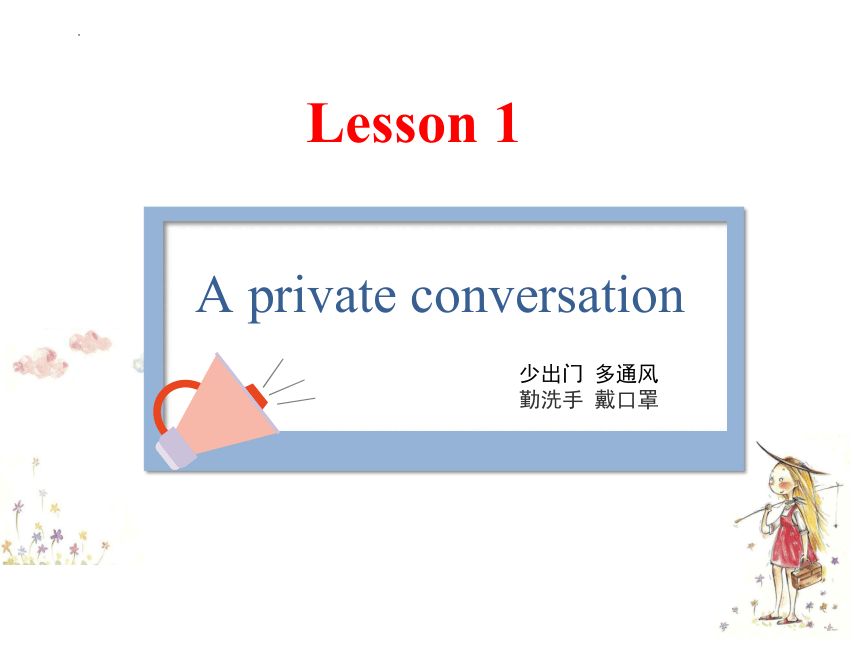 | |
| 格式 | pptx | ||
| 文件大小 | 7.6MB | ||
| 资源类型 | 教案 | ||
| 版本资源 | 新概念英语 | ||
| 科目 | 英语 | ||
| 更新时间 | 2024-07-30 09:29:22 | ||
图片预览

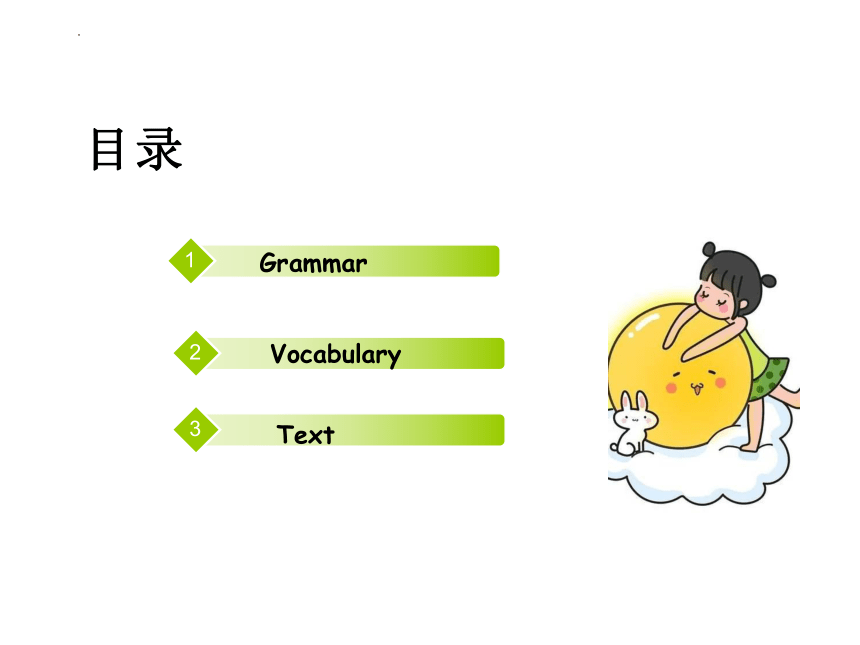
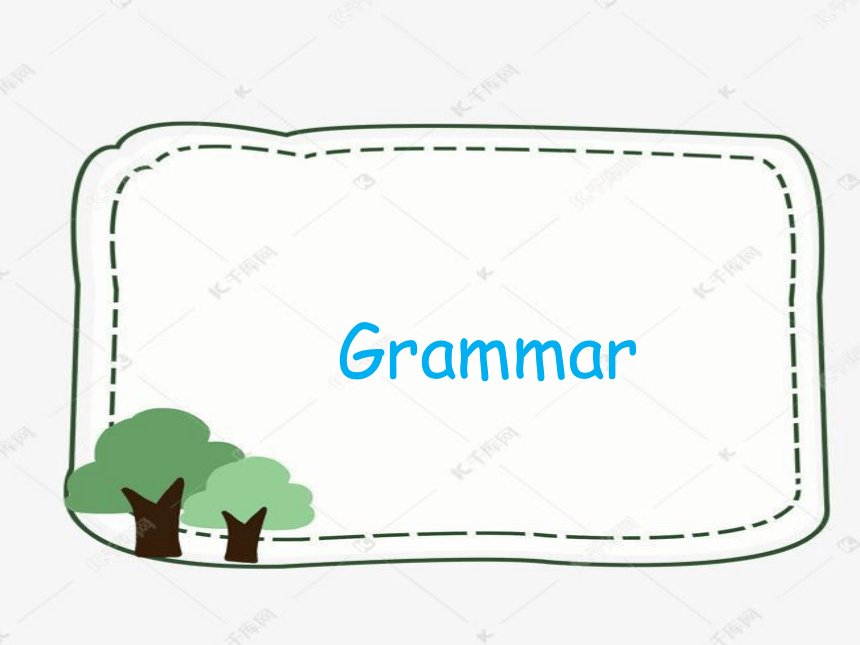
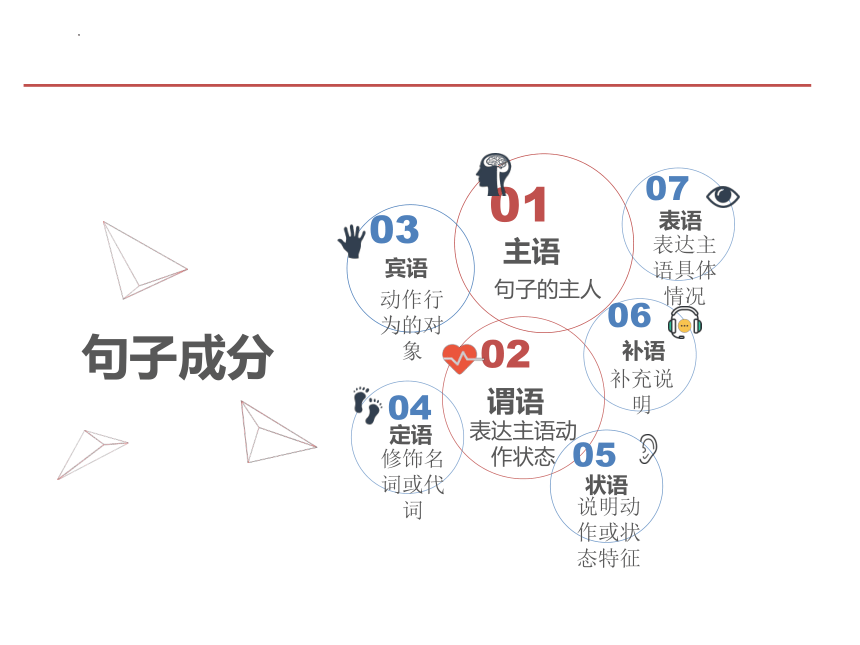
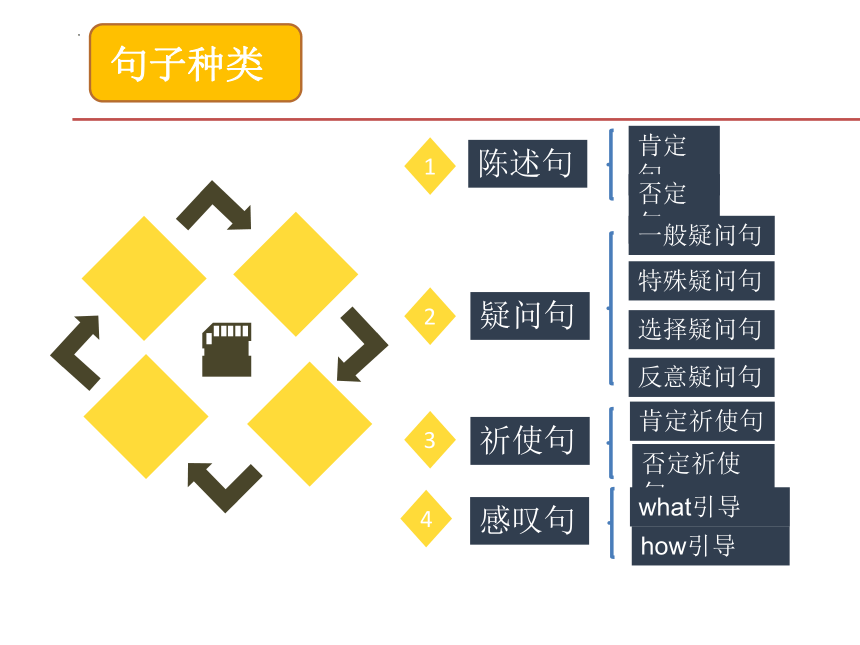
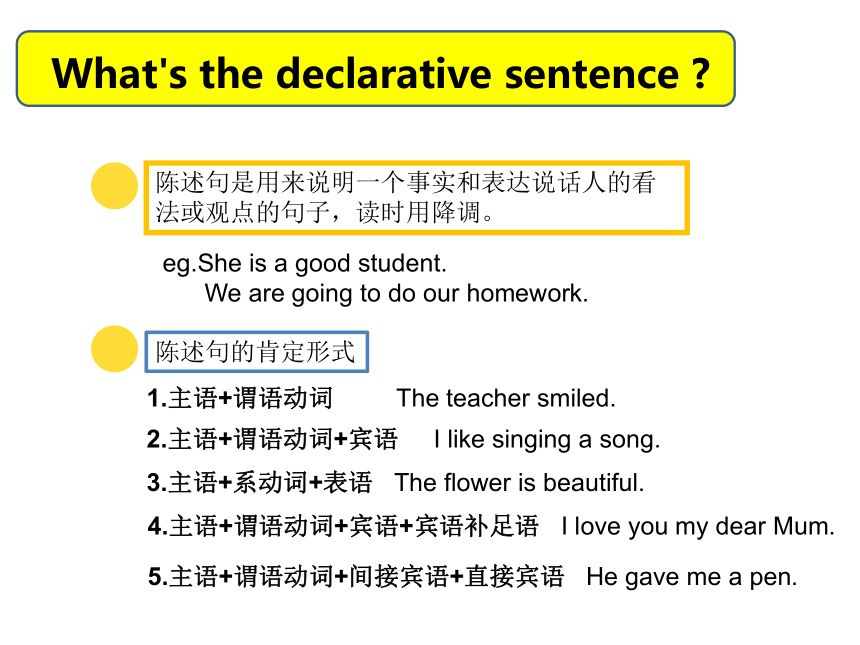
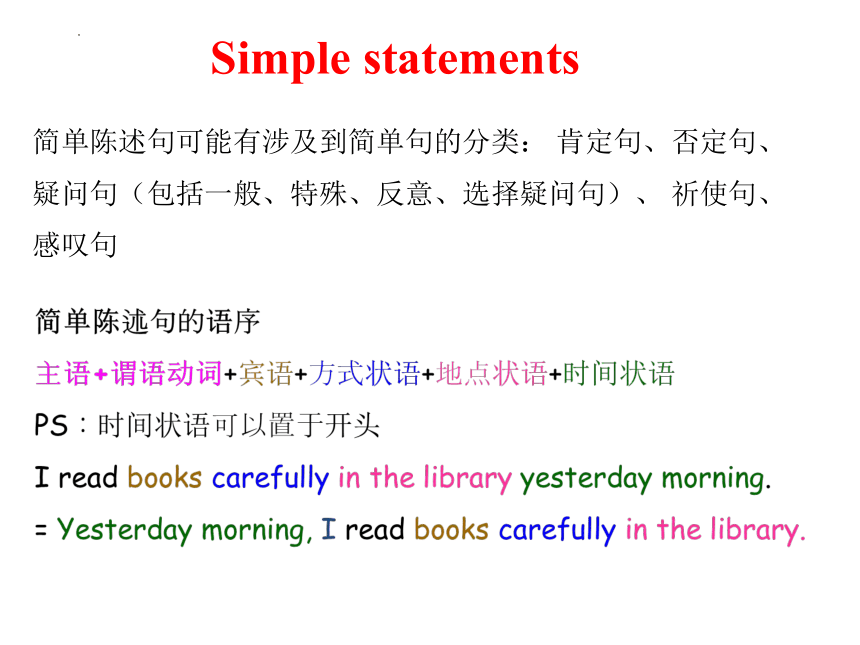
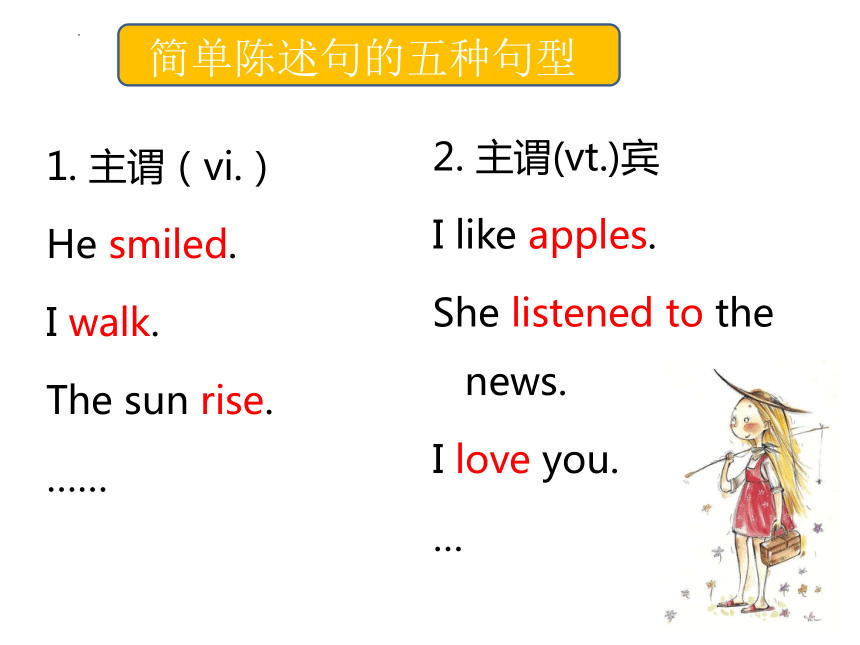
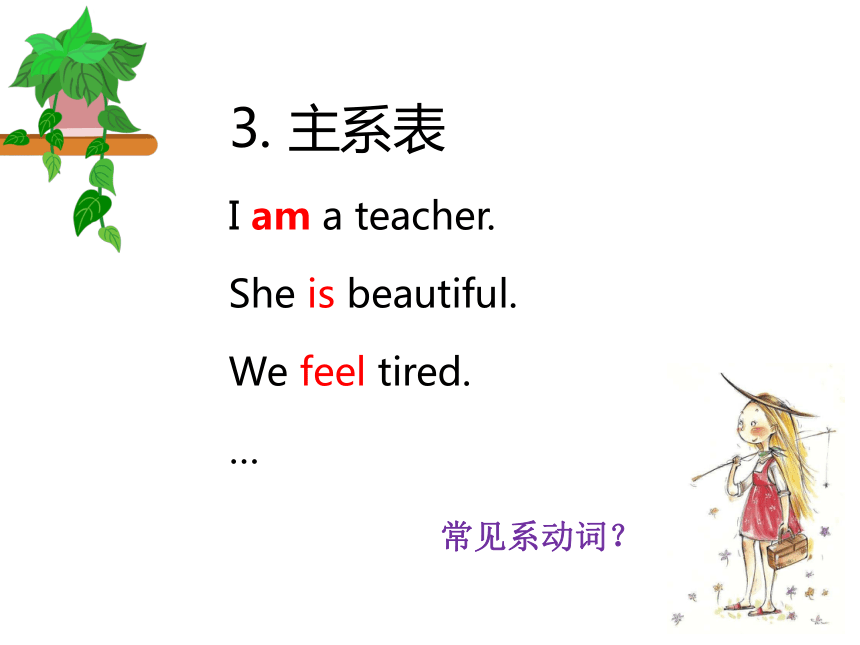
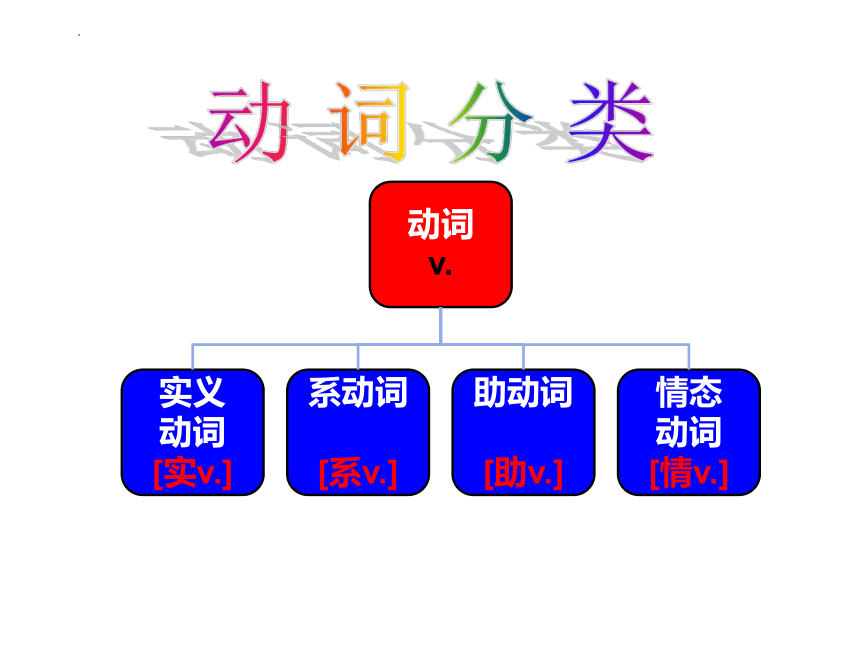
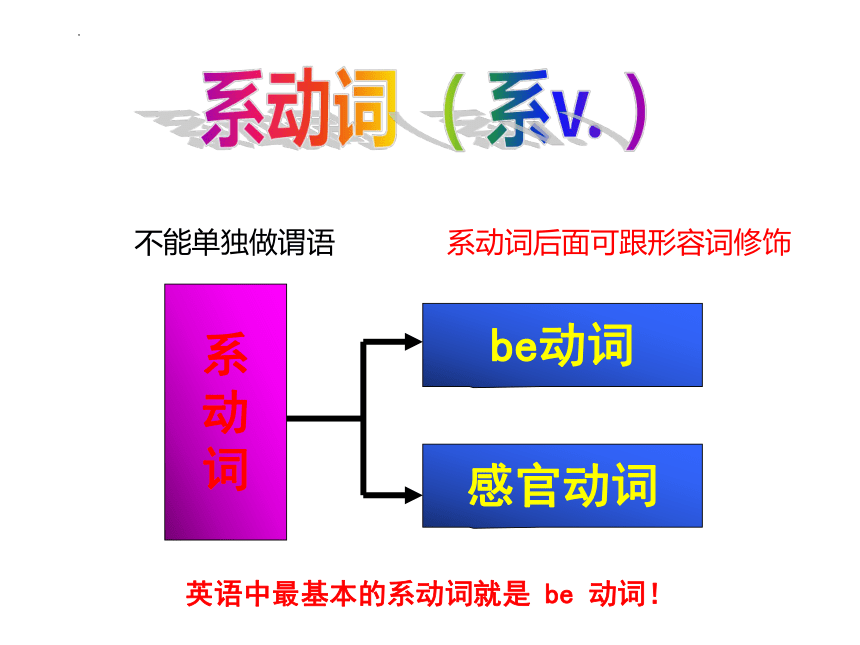
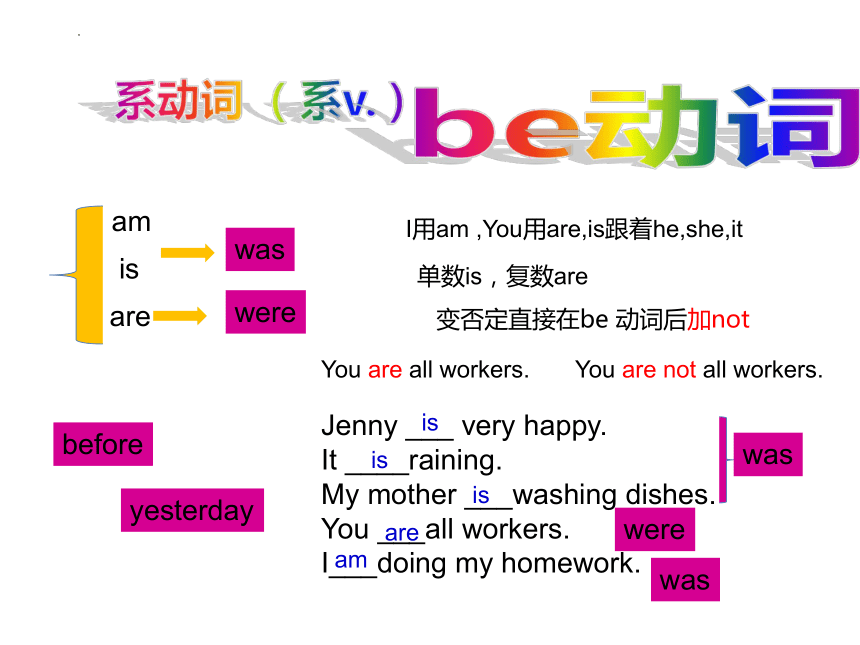
文档简介
Lesson 1
少出门 多通风
勤洗手 戴口罩
A private conversation
Grammar
1
Vocabulary
2
Text
3
目录
Grammar
01
句子的主人
主语
02
表达主语动作状态
谓语
03
宾语
05
句子成分
04
07
06
动作行为的对象
定语
修饰名词或代词
说明动作或状态特征
状语
补语
补充说明
表语
表达主语具体情况
1
陈述句
肯定句
否定句
2
疑问句
一般疑问句
特殊疑问句
选择疑问句
反意疑问句
3
祈使句
肯定祈使句
否定祈使句
4
感叹句
what引导
how引导
句子种类
What's the declarative sentence ?
陈述句是用来说明一个事实和表达说话人的看法或观点的句子,读时用降调。
eg.She is a good student.
We are going to do our homework.
陈述句的肯定形式
3.主语+系动词+表语 The flower is beautiful.
1.主语+谓语动词 The teacher smiled.
2.主语+谓语动词+宾语 I like singing a song.
4.主语+谓语动词+宾语+宾语补足语 I love you my dear Mum.
5.主语+谓语动词+间接宾语+直接宾语 He gave me a pen.
Simple statements
简单陈述句可能有涉及到简单句的分类: 肯定句、否定句、疑问句(包括一般、特殊、反意、选择疑问句)、 祈使句、 感叹句
1. 主谓(vi.)
He smiled.
I walk.
The sun rise.
……
简单陈述句的五种句型
2. 主谓(vt.)宾
I like apples.
She listened to the news.
I love you.
…
3. 主系表
I am a teacher.
She is beautiful.
We feel tired.
…
常见系动词?
动 词 分 类
动词
v.
实义
动词
[实v.]
系动词
[系v.]
助动词
[助v.]
情态
动词
[情v.]
系动词 (系v.)
系
动
词
be动词
感官动词
英语中最基本的系动词就是 be 动词!
不能单独做谓语
系动词后面可跟形容词修饰
be动词
系动词 (系v.)
am
is
are
I用am ,You用are,is跟着he,she,it
单数is,复数are
were
变否定直接在be 动词后加not
You are all workers.
You are not all workers.
Jenny ___ very happy.
It ____raining.
My mother ___washing dishes.
You ___all workers.
I___doing my homework.
yesterday
before
is
is
is
are
am
were
was
was
was
be动词
系动词 (系v.)
Jenny ___ very happy.
is
变一疑:
一提:be动词往前提
二变:小写变大写,第一人称变第二人称
三问号:后面加?
Is Jenny very happy?
How old ______ she?
We ________ good friends.
Their classroom ______ over there.
_____ there any milk in the glass?
When __ Victor’s birthday? It __ in Dec.
I _______ fine, thank you.
is
are
is
Is
is
is
am
be动词
系动词 (系v.)
① sound 听起来 ② look 看起来 ③ seem 看起来
④ smell 闻起来 ⑤ taste 尝起来 ⑥ feel 感觉起来
【感官动词:“……起来”】
become 变成 turn 变成 get 变得 go 变得
“一听二看三感觉”
【系v.】和【实v.】的唯一区别:
实v. 后面不能跟形容词,而是adv. 或者n.
感官动词
系动词 (系v.)
Her face ______ ____ red. 她的脸变红了
Jack ______ sad. 杰克看起来很伤心。
That ______ good. 那听起来不错。
Tom doesn't _______well today. 汤姆今天感觉不舒服。
turns/turned
looks/looked
sounds
feel
操练一下
变否定:需要do/does/did+not帮忙
Tips :助动词是照妖镜,后面动词现原形
变一疑:
一提:助动词往前提
二变:后面动词现原形,第一人称变第二人称
三问号:后面加?
Her face ______ ____ red.
doesn't
turn
Her face turns red .
Does her face turn red?
.
感官动词
系动词 (系v.)
4. 主+谓+间宾+直宾
She gave him a pen.
My father bought me a little dog.
Linda lent me a book.
…
5. 主+谓+宾+宾补
I find him tired.
We must keep our room clean.
We make them happy.
…
She is a teacher.
He is handsome.
I like bananas.
You are bad.
She feels cold.
They look tired.
I found the sky blue.
I love you.
My sister hates a boy.
Leo is a naughty boy.
That smells good.
They made me sad.
Jimmy ate lots of things.
Grace has a sister.
Mary is a quiet girl.
Michael gave me a book.
Ainns is not tall.
Lily likes flowers.
Hannah is smart.
主谓宾副地时
Order them!
I drank the milk thirstily
in the dinning room this morning.
I
drank
the milk
thirstily
in the dinning room
this morning.
Vocabulary
My story
Attention
In August, I went to the movie theater to watch it.
I had a very good seat.
C
B
A
The movie was very interesting,
but I did not enjoy it.
WHY
Two young people were sitting behind me.
They were talking loudly!
I got very angry!
I looked at them angrily!
It’s none of your business!
rudely
Where did I go?
Did I enjoy it?
Who were sitting behind me?
What were they doing?
What did the man say?
Answer the questions:
Lead-in
What do you think is happening in the picture?
A man turned round and looked at the man and the woman angrily.
New words and expressions
Grammar
Text & key points
Ready?
New words & expressions
private adj. 私人的 angry adj. 生气的
conversation n. 谈话 angrily adv. 生气地
theatre n. 剧场,戏院 attention n. 注意
seat n. 坐位 bear v. 容忍
play n. 戏 business n. 事
loudly adv. 大声地
rudely adv. 无理地,粗鲁地
Uncle Zhao
This is my private aircraft.
private adj.
I have a private computer.
a private letter
in private
私下地
Let me speak to him _______.
in private
opposite word:
public
conversation ?n.
have a conversation with sb.
与某人谈话
have a conversation about sth.
谈论某事
I’ll __________________ Lisa her English test.
an informal talk
n. 会话,会谈
have a conversation with
about
talk
内容可正式可不正式
conversation
一般用于正式文体中, 内容上往往不正式
theatre
[写法区别]
tre为英式写法,ter为美式写法:
theatre , theater 剧院
metre, meter 米
centre, center 中心
[经典用法]
go to the theater 去看戏
Shakespeare’s Globe Theatre
Sydney Opera House
Broadway
seat n. sit v.
请坐:
Have/take a seat, please.
Sit down, please. (上级对下级)
n. 戏
watch a play
v. 玩,演奏
play basketball
play the piano
play
[作v.] play后接“球类”:
play basketball/football打篮球, 踢足球
play chess下国际象棋
play 后必须接定冠词the 再加“乐器”:
play the violin拉小提琴, play the fife吹笛子
★loudly : adv. 大声地
Text in here
Text in here
loud adj. & adv. 大声
loudly adv.
aloud adv. read aloud
loud/loudly/aloud 填空
The children are shouting ________ in the street.
Students, please read the text _______.
loudly
aloud
★ angry adj. 生气的
angrily adv. 生气地
[扩充学习]
cross 生气的
angry 生气的 (英式)
mad 气的发疯 (美式)
be blue in the face 气得发紫
★ rude adj. 粗鲁的
rudely adv. 粗鲁地
Matching
angrily adv.
loudly adv.
rudely adv.
大声地
无礼地,粗鲁的
生气地
形容词→副词
adj + ly → adv
形容词—副词规则
一般直接+ly, 如quickly,sadly;
以辅音字母+y结尾的,变y为i加ly;
如lazy-lazily, happy-happily;
以ll结尾的,直接加y,如fully;
以辅音字母+le结尾的,变e为y,如:
able-ably, single-singly,simple-simply
以元音字母+e结尾的,去e加ly,如true-truly
形容词与副词同形,如late,fast。
He closed the door________ (rude, rudely)
Linda played with her sister________ (happy, happily)
She did her homework__________ (careful, carefully)
The girl is sleeping____________ (peaceful, peacefully)
The dog is very________ (love, lovely)
rudely
happily
carefully
peacefully
lovely
★attention n. 注意
pay attention + to (doing) sth
请注意你的发音。(pronunciation)
Please pay attention to your pronunciation.
★bear (bore, borne) v. 容忍
bear
stand
I can’t bear you!
I can’t bear living here.
I can’t bear to live here.
忍受的极限在加大
跟can、could连用
★ business n. 事, 生意
1. n. 生意
business man : 生意人
do business: 做生意
on business: 因公出差
2. n. 事情(私事)
It's my business. (指私人的事, 自己处理)
It’s none of your business. 不关你的事。
private
conversation
play
loudly
attention
rude
bear
angrily
business
rudely
theatre
seat
loud
angry
Words of lesson 1
stand
public
XP5 1 适当形式填空
Text
1.Where did the writer go last week?
2. Did he enjoy the play or not?
Listen & Think
1.Last week I went to the theatre.
[参考翻译] 上个星期,我去了戏院看戏。
[语言点1] 时间状语开门见山,过去的时间用过去时态顺理成章。故将go改为 went。
[语言点2] 在theatre,cinema,pictures等词之前一定要加定冠词the。
例如:
go to the theatre = go to the play去看戏
go to the cinema 去看电影(英式英语)
go to the movies 去看电影(美式英语)
go to the pictures 去看电影
be at the theatre/cinema
在戏院看戏/在电影院看电影
2. I had a very good seat.
[参考翻译] 我的座位相当好。
[语言点1] had的原形have,沿续last week的时态。
[语言点2] a very good seat = a very good place
视线无遮挡,所处的位置非常好,而非椅子本身材料好。
2.? The play was very interesting.
[参考翻译] 那场戏剧演得非常有意思。
[语言点] very 为副词,interesting为形容词,副词修饰形容词一般放在其前面。
interesting adj. 修饰物
interest n. & v.
interested adj. 修饰人
interesting adj.
---ing 令人… 的
---ed 感到… 的
This book is interesting. 书有趣
be interested in… 对……感兴趣
interest n. 兴趣
have an interest in… 对…感兴趣
The film is very _________.
I am __________ to see it.
exciting / excited
exciting
excited
4. I did not enjoy it.
[参考翻译] 但是我却颇为扫兴。
[语言点] enjoy 的用法:
① enjoy sth 从sth中得到精神上的娱乐或快乐,比like意义要深得多。
enjoy music享受音乐, enjoy life享受生活
② enjoy doing
enjoy swimming 喜欢游泳, enjoy fishing喜爱钓鱼
③ 一般不可说enjoy sb
This morning I enjoyed my English teacher.
但enjoy oneself是个例外!
5.? A young man and a young woman
were sitting behind me.
[参考翻译] 一对年青的男女正坐在我的后面。
[语言点] young adj., man n. 形容词修饰名词作定语。请注意它的位置,一般放在被修饰的名词之前,但如果是介词短语、形容词短语或修饰名词的从句则放在被修饰名词之后。
a man in the room(介词短语)
在房间里的一个男人
Is it a problem difficult to solve(形容词短语)?
这是个难解决的问题吗?
6.? They were talking loudly.
[参考翻译] 他们俩在那里一直大声地交谈着。
[语言点1] talking 为动词,loudly副词,副词修饰动词一般放其后面。
hit hard重重地打, speak slowly大声地说,touch softly温柔地抚摸
[语言点2] were talking 过去进行时,为何而不用“They talked loudly.”?
原因:be doing 是介绍背景的最佳选择,可以起到加强印象的效果。
比较:I speak English.我讲英语。
I am speaking English now.
我现在正在讲英语。
7.? I got very angry.
[参考翻译] 我变得非常生气。
[语言点]比较:
I was very angry.我过去很生气。
I got very angry.我变得非常生气。
原因:用get表示变得,强调有变化的过程。
总结用法:get在作“变得”时常后接形容词
got old变老, got hot变热, got hungry感到饥饿的,均含有渐进的意味。
8.? I could not hear the actors.
[参考翻译] 我听不见演员们在说什么。
[语言点]
hear v. 听到
Can you hear the signal? 你能听到这信号吗?
listen to 听
Don‘t listen to him. 不要听他的话。
9.? I turned round.
[参考翻译] 我转过了身去。
[语言点1] turn转过,round 周围;围绕
turn round 转身,
turn left 向左转,
turn right向右转,
turn over翻身
[语言点2]
turn round 英式英语 turn around 美式英语
10. I looked at the man and the woman angrily.
[参考翻译] 我生气地看着那一对男女。
[语言点] 比较学习:
see 看见(结果)
watch 观看(动态)
look 看(动作)
Look, look! 快看,快看 ,不会说watch, watch
look at 看着(持续动作)
Please look at my fingers.请看着我的手指。
11. They did not pay any attention.
[参考翻译] 但是他们压根就没有看我一眼。
[语言点1]
要想表达注意的程度只需在attention前加形容词即可:
pay no/any attention to 不注意
pay a little attention to 稍加注意
pay much attention to 比较注意
pay more attention to 更加注意
pay great attention to 非常注意
pay close attention to 关注,盯着=focus on, start at
pay no attention
a little
much
more
close
0% 20% 40% 60% 80% 100%
[语言点2]
any一般用在否定句中,pay any attention 意思为“根本就不注意”。
此处pay any attention后无介词to,补充完整应为They did not pay any attention to me.
介词to后常接目的宾语,但无目的宾语则省去介词to。
12. In the end ,I could not bear it .
[参考翻译] 最后,我实在忍无可忍了。
[语言点] 辨析学习:
表达“最后” in the end =at last=finally
in the end 经过一系列变化后最终发生。
at last 经过克服困难,最终达到目的。
finally 按照一定的顺序进行到最后。
13. I turned round again. ‘I can’t hear a word!’ I said angrily.
[参考翻译] 我再次转过身去,并生气地说到:“我一个字都听不清!”
[语言点] 口语中经常会说:
Can I have a word with you?
= May I talk with you?
重要谚语:Actions speak louder than words.
行胜于言。
I couldn’t hear the actor.
hear sb. 听见某人说话
hear from sb. 收到某人来信
hear of sb./sth. 知道某人(某事)
hear about sth. 听说、得悉某消息
e.g. I can’t hear you.
I hear from my mother once a week.
I’ve never heard of her.
I just hear about his illness.
14. ‘It’s none of your business,’ the young man said rudely. ‘ This is a private conversation!’
[参考翻译] “这不关你的事”,那个年青的男人说,”这是我们私人之间的谈话。”
[语言点]
三个或三个以上都不
None of the books is/are good.
none of +可数名词复数+V单/V复
None of the water is allowed to drink.
none of + 不可数名词 + V单
少出门 多通风
勤洗手 戴口罩
A private conversation
Grammar
1
Vocabulary
2
Text
3
目录
Grammar
01
句子的主人
主语
02
表达主语动作状态
谓语
03
宾语
05
句子成分
04
07
06
动作行为的对象
定语
修饰名词或代词
说明动作或状态特征
状语
补语
补充说明
表语
表达主语具体情况
1
陈述句
肯定句
否定句
2
疑问句
一般疑问句
特殊疑问句
选择疑问句
反意疑问句
3
祈使句
肯定祈使句
否定祈使句
4
感叹句
what引导
how引导
句子种类
What's the declarative sentence ?
陈述句是用来说明一个事实和表达说话人的看法或观点的句子,读时用降调。
eg.She is a good student.
We are going to do our homework.
陈述句的肯定形式
3.主语+系动词+表语 The flower is beautiful.
1.主语+谓语动词 The teacher smiled.
2.主语+谓语动词+宾语 I like singing a song.
4.主语+谓语动词+宾语+宾语补足语 I love you my dear Mum.
5.主语+谓语动词+间接宾语+直接宾语 He gave me a pen.
Simple statements
简单陈述句可能有涉及到简单句的分类: 肯定句、否定句、疑问句(包括一般、特殊、反意、选择疑问句)、 祈使句、 感叹句
1. 主谓(vi.)
He smiled.
I walk.
The sun rise.
……
简单陈述句的五种句型
2. 主谓(vt.)宾
I like apples.
She listened to the news.
I love you.
…
3. 主系表
I am a teacher.
She is beautiful.
We feel tired.
…
常见系动词?
动 词 分 类
动词
v.
实义
动词
[实v.]
系动词
[系v.]
助动词
[助v.]
情态
动词
[情v.]
系动词 (系v.)
系
动
词
be动词
感官动词
英语中最基本的系动词就是 be 动词!
不能单独做谓语
系动词后面可跟形容词修饰
be动词
系动词 (系v.)
am
is
are
I用am ,You用are,is跟着he,she,it
单数is,复数are
were
变否定直接在be 动词后加not
You are all workers.
You are not all workers.
Jenny ___ very happy.
It ____raining.
My mother ___washing dishes.
You ___all workers.
I___doing my homework.
yesterday
before
is
is
is
are
am
were
was
was
was
be动词
系动词 (系v.)
Jenny ___ very happy.
is
变一疑:
一提:be动词往前提
二变:小写变大写,第一人称变第二人称
三问号:后面加?
Is Jenny very happy?
How old ______ she?
We ________ good friends.
Their classroom ______ over there.
_____ there any milk in the glass?
When __ Victor’s birthday? It __ in Dec.
I _______ fine, thank you.
is
are
is
Is
is
is
am
be动词
系动词 (系v.)
① sound 听起来 ② look 看起来 ③ seem 看起来
④ smell 闻起来 ⑤ taste 尝起来 ⑥ feel 感觉起来
【感官动词:“……起来”】
become 变成 turn 变成 get 变得 go 变得
“一听二看三感觉”
【系v.】和【实v.】的唯一区别:
实v. 后面不能跟形容词,而是adv. 或者n.
感官动词
系动词 (系v.)
Her face ______ ____ red. 她的脸变红了
Jack ______ sad. 杰克看起来很伤心。
That ______ good. 那听起来不错。
Tom doesn't _______well today. 汤姆今天感觉不舒服。
turns/turned
looks/looked
sounds
feel
操练一下
变否定:需要do/does/did+not帮忙
Tips :助动词是照妖镜,后面动词现原形
变一疑:
一提:助动词往前提
二变:后面动词现原形,第一人称变第二人称
三问号:后面加?
Her face ______ ____ red.
doesn't
turn
Her face turns red .
Does her face turn red?
.
感官动词
系动词 (系v.)
4. 主+谓+间宾+直宾
She gave him a pen.
My father bought me a little dog.
Linda lent me a book.
…
5. 主+谓+宾+宾补
I find him tired.
We must keep our room clean.
We make them happy.
…
She is a teacher.
He is handsome.
I like bananas.
You are bad.
She feels cold.
They look tired.
I found the sky blue.
I love you.
My sister hates a boy.
Leo is a naughty boy.
That smells good.
They made me sad.
Jimmy ate lots of things.
Grace has a sister.
Mary is a quiet girl.
Michael gave me a book.
Ainns is not tall.
Lily likes flowers.
Hannah is smart.
主谓宾副地时
Order them!
I drank the milk thirstily
in the dinning room this morning.
I
drank
the milk
thirstily
in the dinning room
this morning.
Vocabulary
My story
Attention
In August, I went to the movie theater to watch it.
I had a very good seat.
C
B
A
The movie was very interesting,
but I did not enjoy it.
WHY
Two young people were sitting behind me.
They were talking loudly!
I got very angry!
I looked at them angrily!
It’s none of your business!
rudely
Where did I go?
Did I enjoy it?
Who were sitting behind me?
What were they doing?
What did the man say?
Answer the questions:
Lead-in
What do you think is happening in the picture?
A man turned round and looked at the man and the woman angrily.
New words and expressions
Grammar
Text & key points
Ready?
New words & expressions
private adj. 私人的 angry adj. 生气的
conversation n. 谈话 angrily adv. 生气地
theatre n. 剧场,戏院 attention n. 注意
seat n. 坐位 bear v. 容忍
play n. 戏 business n. 事
loudly adv. 大声地
rudely adv. 无理地,粗鲁地
Uncle Zhao
This is my private aircraft.
private adj.
I have a private computer.
a private letter
in private
私下地
Let me speak to him _______.
in private
opposite word:
public
conversation ?n.
have a conversation with sb.
与某人谈话
have a conversation about sth.
谈论某事
I’ll __________________ Lisa her English test.
an informal talk
n. 会话,会谈
have a conversation with
about
talk
内容可正式可不正式
conversation
一般用于正式文体中, 内容上往往不正式
theatre
[写法区别]
tre为英式写法,ter为美式写法:
theatre , theater 剧院
metre, meter 米
centre, center 中心
[经典用法]
go to the theater 去看戏
Shakespeare’s Globe Theatre
Sydney Opera House
Broadway
seat n. sit v.
请坐:
Have/take a seat, please.
Sit down, please. (上级对下级)
n. 戏
watch a play
v. 玩,演奏
play basketball
play the piano
play
[作v.] play后接“球类”:
play basketball/football打篮球, 踢足球
play chess下国际象棋
play 后必须接定冠词the 再加“乐器”:
play the violin拉小提琴, play the fife吹笛子
★loudly : adv. 大声地
Text in here
Text in here
loud adj. & adv. 大声
loudly adv.
aloud adv. read aloud
loud/loudly/aloud 填空
The children are shouting ________ in the street.
Students, please read the text _______.
loudly
aloud
★ angry adj. 生气的
angrily adv. 生气地
[扩充学习]
cross 生气的
angry 生气的 (英式)
mad 气的发疯 (美式)
be blue in the face 气得发紫
★ rude adj. 粗鲁的
rudely adv. 粗鲁地
Matching
angrily adv.
loudly adv.
rudely adv.
大声地
无礼地,粗鲁的
生气地
形容词→副词
adj + ly → adv
形容词—副词规则
一般直接+ly, 如quickly,sadly;
以辅音字母+y结尾的,变y为i加ly;
如lazy-lazily, happy-happily;
以ll结尾的,直接加y,如fully;
以辅音字母+le结尾的,变e为y,如:
able-ably, single-singly,simple-simply
以元音字母+e结尾的,去e加ly,如true-truly
形容词与副词同形,如late,fast。
He closed the door________ (rude, rudely)
Linda played with her sister________ (happy, happily)
She did her homework__________ (careful, carefully)
The girl is sleeping____________ (peaceful, peacefully)
The dog is very________ (love, lovely)
rudely
happily
carefully
peacefully
lovely
★attention n. 注意
pay attention + to (doing) sth
请注意你的发音。(pronunciation)
Please pay attention to your pronunciation.
★bear (bore, borne) v. 容忍
bear
stand
I can’t bear you!
I can’t bear living here.
I can’t bear to live here.
忍受的极限在加大
跟can、could连用
★ business n. 事, 生意
1. n. 生意
business man : 生意人
do business: 做生意
on business: 因公出差
2. n. 事情(私事)
It's my business. (指私人的事, 自己处理)
It’s none of your business. 不关你的事。
private
conversation
play
loudly
attention
rude
bear
angrily
business
rudely
theatre
seat
loud
angry
Words of lesson 1
stand
public
XP5 1 适当形式填空
Text
1.Where did the writer go last week?
2. Did he enjoy the play or not?
Listen & Think
1.Last week I went to the theatre.
[参考翻译] 上个星期,我去了戏院看戏。
[语言点1] 时间状语开门见山,过去的时间用过去时态顺理成章。故将go改为 went。
[语言点2] 在theatre,cinema,pictures等词之前一定要加定冠词the。
例如:
go to the theatre = go to the play去看戏
go to the cinema 去看电影(英式英语)
go to the movies 去看电影(美式英语)
go to the pictures 去看电影
be at the theatre/cinema
在戏院看戏/在电影院看电影
2. I had a very good seat.
[参考翻译] 我的座位相当好。
[语言点1] had的原形have,沿续last week的时态。
[语言点2] a very good seat = a very good place
视线无遮挡,所处的位置非常好,而非椅子本身材料好。
2.? The play was very interesting.
[参考翻译] 那场戏剧演得非常有意思。
[语言点] very 为副词,interesting为形容词,副词修饰形容词一般放在其前面。
interesting adj. 修饰物
interest n. & v.
interested adj. 修饰人
interesting adj.
---ing 令人… 的
---ed 感到… 的
This book is interesting. 书有趣
be interested in… 对……感兴趣
interest n. 兴趣
have an interest in… 对…感兴趣
The film is very _________.
I am __________ to see it.
exciting / excited
exciting
excited
4. I did not enjoy it.
[参考翻译] 但是我却颇为扫兴。
[语言点] enjoy 的用法:
① enjoy sth 从sth中得到精神上的娱乐或快乐,比like意义要深得多。
enjoy music享受音乐, enjoy life享受生活
② enjoy doing
enjoy swimming 喜欢游泳, enjoy fishing喜爱钓鱼
③ 一般不可说enjoy sb
This morning I enjoyed my English teacher.
但enjoy oneself是个例外!
5.? A young man and a young woman
were sitting behind me.
[参考翻译] 一对年青的男女正坐在我的后面。
[语言点] young adj., man n. 形容词修饰名词作定语。请注意它的位置,一般放在被修饰的名词之前,但如果是介词短语、形容词短语或修饰名词的从句则放在被修饰名词之后。
a man in the room(介词短语)
在房间里的一个男人
Is it a problem difficult to solve(形容词短语)?
这是个难解决的问题吗?
6.? They were talking loudly.
[参考翻译] 他们俩在那里一直大声地交谈着。
[语言点1] talking 为动词,loudly副词,副词修饰动词一般放其后面。
hit hard重重地打, speak slowly大声地说,touch softly温柔地抚摸
[语言点2] were talking 过去进行时,为何而不用“They talked loudly.”?
原因:be doing 是介绍背景的最佳选择,可以起到加强印象的效果。
比较:I speak English.我讲英语。
I am speaking English now.
我现在正在讲英语。
7.? I got very angry.
[参考翻译] 我变得非常生气。
[语言点]比较:
I was very angry.我过去很生气。
I got very angry.我变得非常生气。
原因:用get表示变得,强调有变化的过程。
总结用法:get在作“变得”时常后接形容词
got old变老, got hot变热, got hungry感到饥饿的,均含有渐进的意味。
8.? I could not hear the actors.
[参考翻译] 我听不见演员们在说什么。
[语言点]
hear v. 听到
Can you hear the signal? 你能听到这信号吗?
listen to 听
Don‘t listen to him. 不要听他的话。
9.? I turned round.
[参考翻译] 我转过了身去。
[语言点1] turn转过,round 周围;围绕
turn round 转身,
turn left 向左转,
turn right向右转,
turn over翻身
[语言点2]
turn round 英式英语 turn around 美式英语
10. I looked at the man and the woman angrily.
[参考翻译] 我生气地看着那一对男女。
[语言点] 比较学习:
see 看见(结果)
watch 观看(动态)
look 看(动作)
Look, look! 快看,快看 ,不会说watch, watch
look at 看着(持续动作)
Please look at my fingers.请看着我的手指。
11. They did not pay any attention.
[参考翻译] 但是他们压根就没有看我一眼。
[语言点1]
要想表达注意的程度只需在attention前加形容词即可:
pay no/any attention to 不注意
pay a little attention to 稍加注意
pay much attention to 比较注意
pay more attention to 更加注意
pay great attention to 非常注意
pay close attention to 关注,盯着=focus on, start at
pay no attention
a little
much
more
close
0% 20% 40% 60% 80% 100%
[语言点2]
any一般用在否定句中,pay any attention 意思为“根本就不注意”。
此处pay any attention后无介词to,补充完整应为They did not pay any attention to me.
介词to后常接目的宾语,但无目的宾语则省去介词to。
12. In the end ,I could not bear it .
[参考翻译] 最后,我实在忍无可忍了。
[语言点] 辨析学习:
表达“最后” in the end =at last=finally
in the end 经过一系列变化后最终发生。
at last 经过克服困难,最终达到目的。
finally 按照一定的顺序进行到最后。
13. I turned round again. ‘I can’t hear a word!’ I said angrily.
[参考翻译] 我再次转过身去,并生气地说到:“我一个字都听不清!”
[语言点] 口语中经常会说:
Can I have a word with you?
= May I talk with you?
重要谚语:Actions speak louder than words.
行胜于言。
I couldn’t hear the actor.
hear sb. 听见某人说话
hear from sb. 收到某人来信
hear of sb./sth. 知道某人(某事)
hear about sth. 听说、得悉某消息
e.g. I can’t hear you.
I hear from my mother once a week.
I’ve never heard of her.
I just hear about his illness.
14. ‘It’s none of your business,’ the young man said rudely. ‘ This is a private conversation!’
[参考翻译] “这不关你的事”,那个年青的男人说,”这是我们私人之间的谈话。”
[语言点]
三个或三个以上都不
None of the books is/are good.
none of +可数名词复数+V单/V复
None of the water is allowed to drink.
none of + 不可数名词 + V单
同课章节目录
